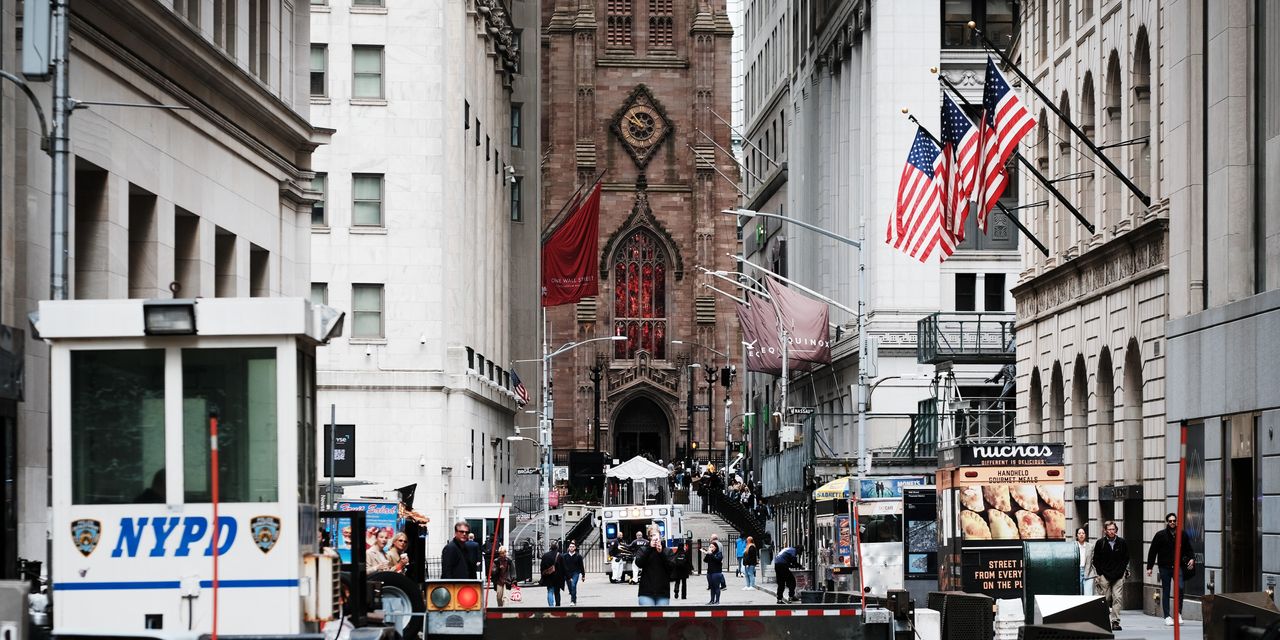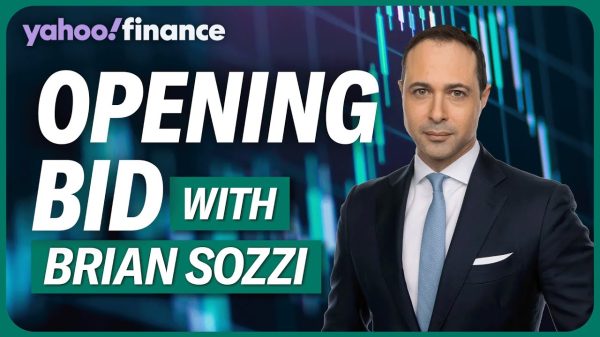U.S. stocks fell on Thursday, with Wall Street headed for its biggest weekly selloff since March, as renewed anxiety over regional bank stocks dragged on, a day after the Federal Reserve raised interest rates but opened the door to a pause in its monetary tightening campaign to combat inflation.
How are stocks trading
-
The S&P 500
SPX,
-0.72%
fell by 32 points, or 0.8%, to 4,058 -
The Dow Jones Industrial Average
DJIA,
-0.86%
declined by 360 points, or 1.1%, to 33,057 -
The Nasdaq Composite
COMP,
-0.49%
was off 58 points, or 0.5%, to 11,967
Th selloff put the S&P 500 on track to suffer its longest losing streak in over two months, while the Nasdaq Composite attempts to post the most amount of consecutive losses in 2023, according to Dow Jones Market Data.
The slide in Dow industrials wiped out its year-to-date gain, down 0.3% as of Thursday afternoon.
What’s driving markets
U.S. stocks fell again with financials leading the way down, as the sector has been under heavy scrutiny by investors following the second-largest bank collapse in U.S. history earlier this week.
Shares of PacWest Bancorp
PACW,
tanked by 45%, extending the steep selloff after-hours Wednesday, amid reports the struggling regional bank’s executives were considering strategic alternatives of their own, which could include a sale.
Shares of other regional banks also saw pressure on Thursday, with the SPDR S&P Regional Bank ETF
KRE,
dropping 4.3%, while the Invesco KBW Regional Banking ETF
KBWR,
was down 2.8%. Western Alliance
WAL,
tumbled 31.2% and saw trading halted multiple times due to volatility after the Phoenix-based regional lender was reported to consider selling its business, among other options. However, the company refuted the report, saying there “is not a single element of the article that is true.”
The volatility bank stocks reflects ongoing anxiety after the seizure of First Republic and the subsequent takeover by JPMorgan Chase.
“It doesn’t necessarily matter the size of the bank. It really matters more about the breadth of earnings and where they’re generated,” said Brian Mulberry, client portfolio manager at Zacks Investment Management.
“Now we certainly favor some of the bigger banks, not just because they don’t suffer from that loss of confidence, but they also have economies of scale where if you’re an institutional bank or an investment bank, you get to be the market maker, which means you make money on the transactions and not just the asset valuations themselves,” Mulberry told MarketWatch in a phone interview.
However, there still could be one more or maybe even a few more regional banks that end up having to “go away” under the stress of the higher interest rates, said Mulberry.
See: Bank stocks drop again as PacWest freefall ‘feeds that narrative’ of weakness despite a ‘fundamentally sound’ businesses
Investors also fear the Federal Reserve might be powerless to ease pressure on the banking sector by cutting rates, said Michael Lebowitz, portfolio manager at RIA Advisors.
“The Fed is stuck, if this would have happened prior to Covid and inflation wasn’t an issue, the Fed would be talking about cutting rates or slowing down on quantitative tightening or stopping it. But right now, they have an inflation problem to deal with,” Lebowitz said.
Traders have already priced in a pause in Federal Reserve’s monetary tightening at the June and July policy meetings, followed by multiple interest rate cuts by year-end, after the central bank raised interest rates by 25 basis points and signaled it may hold off on further increases on Wednesday, according to the CME FedWatch Tool.
“The fact that we haven’t seen any shift in core inflation over the last couple of months, whether it’s CPI or PCE — the core numbers have been pretty static… and that’s gonna be the biggest driver of how long rates stay this hot,” said Mulberry.
See: ‘Taking out the hike that just happened’: Traders ignore Powell and begin pricing in a Fed rate cut as soon as June
Meanwhile, the European Central Bank delivered its latest policy decision, hiking rates by 25 basis points, while ECB President Christine Lagarde hinted at more hikes to come.
Economic data released on Thursday showed the number of Americans who applied for unemployment benefits rose by 13,000 to 242,000 during the final week of April. Meanwhile, the trade deficit narrowed 9% in March to a four-month low of $64.2 billion.
Results from Apple AAPL, the largest U.S. company by market capitalization, are due after the closing bell on Thursday.
Companies in focus
-
First Horizon shares
FHN,
-33.16%
were 33.5% lower after First Horizon Corp. and TD Bank Group
TD,
+0.95%
mutually agreed to end their merger agreement, which was valued at $13.4 billion when it was first announced more than a year ago. -
Qualcomm Inc.‘s
QCOM,
-5.54%
stock sank 5.5% after the chip maker’s forecast fell short of Wall Street expectations on weaker-than-expected handset sales that are pushing inventory drawdowns, that were initially expected to last until June, out for “at least the next couple quarters.” -
Zillow Group Inc.‘s shares
Z,
+9.95%
rose 9.1% after the company reported first-quarter earnings that topped Wall Street views despite an uncertain residential real-estate environment. -
Shopify Inc.
SHOP,
+23.84%
stock jumped 25.6% after the e-commerce company reported a surprise adjusted profit and announced the sale of its logistics business.
— Jamie Chisholm contributed to this article
Read the full article here













